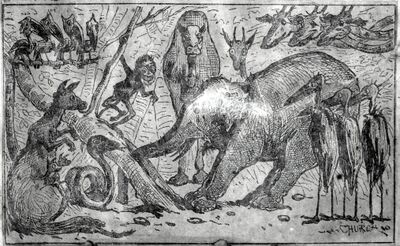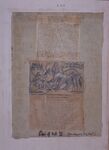HPB-SB-4-246: Difference between revisions
(Created page with "{{HPB-SB-header | volume =4 | page =246 | image = SB-04-246.jpg | notes = | prev =245 | next =247 }} {{Style P-HPB SB. Title continued |Theosophy|4-245}} {{HPB-SB-item...") |
mNo edit summary |
||
| (4 intermediate revisions by 2 users not shown) | |||
| Line 4: | Line 4: | ||
| image = SB-04-246.jpg | | image = SB-04-246.jpg | ||
| notes = | | notes = | ||
}} | }} | ||
{{Style P-HPB SB. Title continued | | |||
{{Style P-HPB SB. Title continued |I have been, for the first time in my life|4-245}} | |||
{{Style P-Poem|poem=An angered wife may stir up strife, | |||
But rarely gains complete ascendance, | |||
Better for life a scolding wife | |||
Than lose for life all self-dependence; | |||
And be for life a wife forsaker, | |||
Yet still, at a woman’s will, a quaker!}} | |||
Again, is it necessary for me to read the works of a celebrated authoress on free love? Further, am I to put myself into the temptation of reading the life of Anne Lee, and, in consequence, of leaving my wife and family? Am I to seek agapemones because there are, Mr. Hepworth Dixon has told us, remarkably charming women there? Am I to be led away by the life and writings of a lady of the last century, mentioned in ''The Spiritualist ''some time back, whose name I forget, who had prepared her ''layette, ''after a supposed immaculate conception, but which never came to anything after all. Or by those of Marguerite Alacoque, of the bleeding heart, concerning whom one could not have wondered at anything that might have taken place? Or, indeed, finally, am I bound to have read Eliphas Levi or the “Count de Gabalis;” or even concerning the Rosicrucians of the middle ages? Mr. Massey says that I have evidently not read a line of their writings, or I should have heard about the elementaries, though not always in a well defined sense. Well, that is only what we have been used to hitherto. But Mr. Massey is a little mistaken: I have read about the Rosicrucians with interest, but not lately; and had forgotten about the elementaries, or I should have not made the mistake of saying they had not been heard of in Europe. So, also, have I read, in former days, something of Eliphas Levi’s writings; indeed, I possess his ''Clef des Grands Mysteres.'' though I have not read his ''Dogme et Rituel de la Haute Magie; ''but I confess that, with all his learning, he is not much to my taste; it may be he is too learned for me. So much the worse for me, Mr. Massey may say. Well, so be it. Eliphas Levi was a ''nom de plume, ''he was the Abbe Constant, I believe, and died in 1876. | |||
{{Style P-Signature in capitals|Scrutator.}} | |||
{{Style P-Signature in capitals|M.A. (Cantab.)}} | |||
{{HPB-SB-item | {{HPB-SB-item | ||
| Line 14: | Line 32: | ||
| item =1 | | item =1 | ||
| type = image | | type = image | ||
| file = | | file = SB-04-246-1.jpg | ||
| status = | | image size = 400px | ||
| status = ok | |||
| author = | | author = | ||
| title = | | title = The Unfortunate Elephant | ||
| untitled = | | untitled = | ||
| notes = | | notes = | ||
| categories = | | categories = | ||
| hide = yes | | hide = yes | ||
| Line 27: | Line 46: | ||
| volume =4 | | volume =4 | ||
| page =246 | | page =246 | ||
| item = | | item =2 | ||
| type = fable | | type = fable | ||
| status = wanted | | status = wanted | ||
| Line 44: | Line 63: | ||
... | ... | ||
{{Style S-HPB SB. HPB note|End of Vol: II. (How many more – of abuse?)|center}} | |||
{{HPB-SB-footer-footnotes}} | |||
Latest revision as of 15:35, 10 February 2024
< I have been, for the first time in my life (continued from page 4-245) >
An angered wife may stir up strife, |
Again, is it necessary for me to read the works of a celebrated authoress on free love? Further, am I to put myself into the temptation of reading the life of Anne Lee, and, in consequence, of leaving my wife and family? Am I to seek agapemones because there are, Mr. Hepworth Dixon has told us, remarkably charming women there? Am I to be led away by the life and writings of a lady of the last century, mentioned in The Spiritualist some time back, whose name I forget, who had prepared her layette, after a supposed immaculate conception, but which never came to anything after all. Or by those of Marguerite Alacoque, of the bleeding heart, concerning whom one could not have wondered at anything that might have taken place? Or, indeed, finally, am I bound to have read Eliphas Levi or the “Count de Gabalis;” or even concerning the Rosicrucians of the middle ages? Mr. Massey says that I have evidently not read a line of their writings, or I should have heard about the elementaries, though not always in a well defined sense. Well, that is only what we have been used to hitherto. But Mr. Massey is a little mistaken: I have read about the Rosicrucians with interest, but not lately; and had forgotten about the elementaries, or I should have not made the mistake of saying they had not been heard of in Europe. So, also, have I read, in former days, something of Eliphas Levi’s writings; indeed, I possess his Clef des Grands Mysteres. though I have not read his Dogme et Rituel de la Haute Magie; but I confess that, with all his learning, he is not much to my taste; it may be he is too learned for me. So much the worse for me, Mr. Massey may say. Well, so be it. Eliphas Levi was a nom de plume, he was the Abbe Constant, I believe, and died in 1876.

The Unfortunate Elephant
...
Editor's notes
